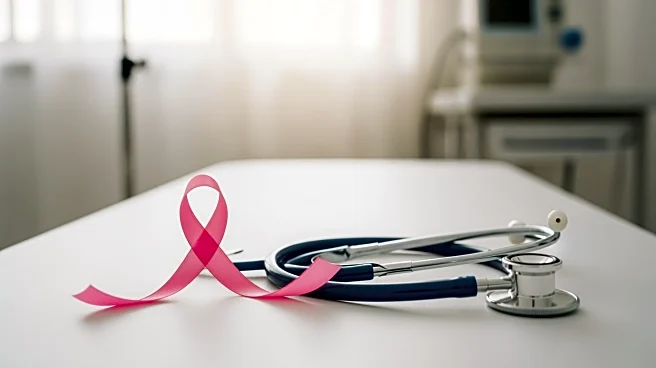What's Happening?
Drew Barrymore, the Emmy-winning host and actress, recently shared a personal health scare on her talk show, The Drew Barrymore Show. During an episode featuring comedian and breast cancer survivor Tig
Notaro, Barrymore revealed that she had to undergo an emergency biopsy after receiving a concerning mammogram result. Despite the initial scare, Barrymore assured her audience that she is now completely fine. The discussion highlighted the emotional toll of waiting for biopsy results, a sentiment echoed by Notaro, who has been in remission from breast cancer since 2013. Barrymore's openness about her experience aims to encourage others to prioritize their health and seek help when needed.
Why It's Important?
Barrymore's disclosure underscores the importance of regular health screenings and the emotional challenges associated with potential health issues. Her experience serves as a reminder of the critical role early detection plays in managing health conditions, particularly breast cancer. By sharing her story, Barrymore hopes to destigmatize health scares and encourage viewers to take proactive steps in their healthcare. This public discussion may influence more individuals to undergo routine screenings, potentially leading to earlier detection and better health outcomes. Additionally, it highlights the value of support systems during health crises, as emphasized by Notaro's personal journey.
What's Next?
Following Barrymore's revelation, there may be increased public interest in breast cancer awareness and the importance of regular mammograms. The Drew Barrymore Show could continue to feature health-related topics, further educating its audience on preventive care and the significance of seeking medical advice promptly. Barrymore's advocacy might inspire other public figures to share their health experiences, contributing to a broader cultural shift towards openness about personal health challenges. This could lead to more widespread acceptance and understanding of the emotional and physical aspects of dealing with health scares.
Beyond the Headlines
Barrymore's candid discussion about her health scare also touches on broader societal issues, such as the stigma surrounding medical procedures and the fear of vulnerability. By publicly addressing her experience, Barrymore challenges the notion that health issues should be kept private, promoting a culture of transparency and support. This approach could encourage more individuals to seek help and share their experiences, fostering a community of empathy and understanding. Furthermore, it highlights the role of media personalities in shaping public discourse on health and wellness.









